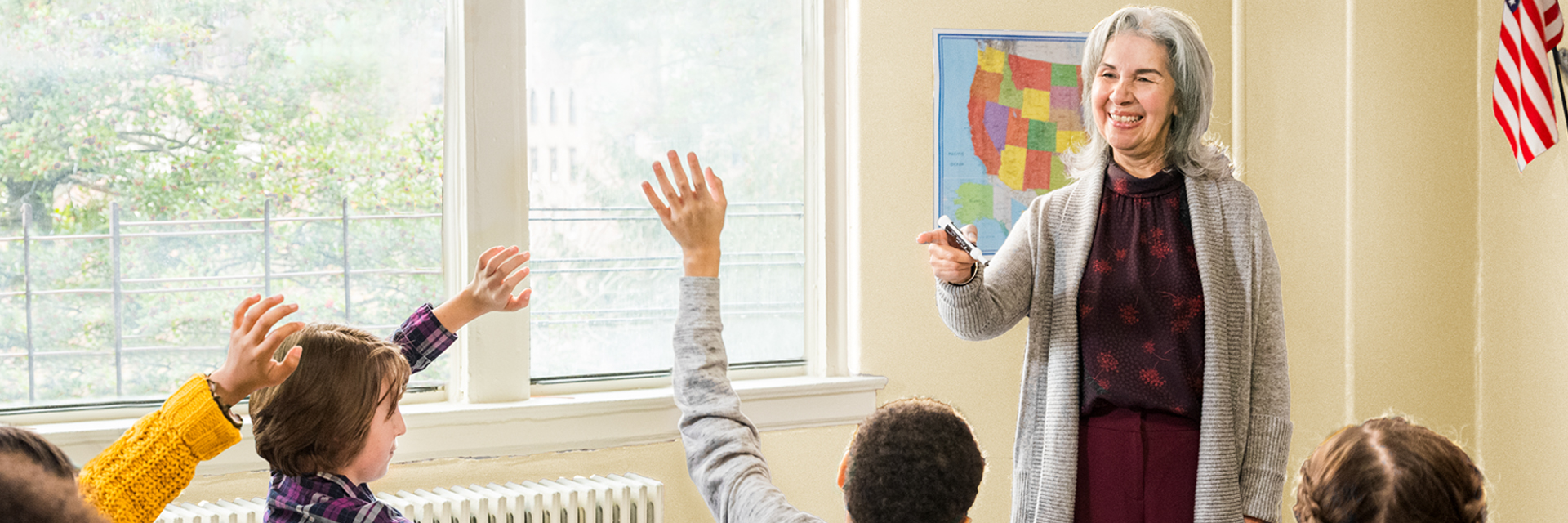
A Lesson in Hope
After Colorectal Cancer, Picking Up Where She Left Off: Elizabeth’s Story
Like many people, Elizabeth was not looking forward to her first colonoscopy. In fact, she delayed getting it for five years.
“I was the type of person who went for every medical test, but the only test I hadn’t had was a colonoscopy,” says the retired teacher from Brooklyn, New York. “People were always scaring me with stories about the prep.”
But when her sister needed a colonoscopy in August 2014, Elizabeth decided it was time she had one too. She accompanied her sister to the procedure and scheduled an appointment for herself.
The process was not nearly as bad as Elizabeth thought it might be. The preparation wasn’t fun, but she got through it. The procedure itself was over before she knew it.
It was the aftermath that was difficult. Elizabeth’s doctor told her that she had colorectal cancer. When cancer affects the colon or rectum, it is referred to as colorectal cancer.
“I was in shock,” she recalls. “I didn’t even know what colorectal cancer was. It was surreal, like you’re in a dream.”
Choosing Her Care Team
Elizabeth’s gastroenterologist recommended three colorectal cancer experts. One of them was surgeon José Guillem at Memorial Sloan Kettering. Elizabeth researched her options and called another one of her regular doctors for a recommendation. All roads led to Dr. Guillem. He was the only surgeon out of the three, she learned, who could preserve Elizabeth’s anal sphincter muscle after surgery. That meant she wouldn’t need to wear a permanent ostomy bag, which is an external pouch that collects stool.
During their first meeting, Dr. Guillem was flanked by medical students he was instructing. Elizabeth remembers feeling like she was in good hands.
“He looked like a rock star because they were hanging on his every word,” she says with a laugh.
Elizabeth was also pleasantly surprised to learn that Dr. Guillem, like her, is a native Spanish speaker.
“The language was a commonality, and it made me feel comfortable,” she says. “When you find a commonality with another person, you have an instant connection.”
Elizabeth’s insightful questions about her condition left an impression on Dr. Guillem.
“She struck me as somebody who was careful and thoughtful,” he says. “When I realized she was a teacher, it made sense. Like all great teachers, she was always very caring, attentive, and a good listener.”
Dr. Guillem recommended that Elizabeth have chemotherapy and radiation followed by surgery. The chemotherapy and radiation would shrink the tumor to a manageable size so that Dr. Guillem could remove it, he explained to her.
The treatments would also fend off any micrometastases. These are tiny bits of cancer that break off from the original tumor and spread elsewhere in the body.
Beginning Treatment
In October 2013, Elizabeth began chemotherapy with medical oncologist Neil Segal. At first, she had an allergic reaction to the type of chemotherapy she was receiving, but Dr. Segal adjusted her dose and gave her antihistamines to counteract these effects. Elizabeth was able to tolerate the medicine much better after that.
She did experience other chemotherapy-related side effects though. She had a reaction to the anesthesia used when she was fitted with a MediPort. This is a tube inserted into a chest vein where medicine can be given. She also developed rashes and neuropathy. Her weight dropped, and she lost her appetite, but she made sure to eat to keep her stamina up. And she had a secret weapon to help her stay motivated throughout treatment.
“Chocolate was one of my best remedies to take away the taste of chemo,” Elizabeth says. “A little piece made everything better. I would also drink kefir [fermented milk] to stabilize my stomach.”
During this time, Elizabeth was teaching in Brooklyn. It was important for her to retain a sense of normalcy as she went for treatment.
“Cancer was not going to dictate or control my life,” she says. Maintaining her regular schedule was important.
When it came time to think about radiation therapy, Elizabeth was hesitant. But radiation oncologist Kathryn Goodman helped Elizabeth realize the severity of her situation.
“She gave me tough love,” Elizabeth recalls. “She said, ‘This isn’t a common cold. This is cancer that needs to be treated aggressively.’ ”
That was the push Elizabeth needed. By June 2014, after one month of radiation therapy, she had curative surgery with Dr. Guillem that left her with no evidence of disease. Elizabeth wore a temporary ostomy bag for three months as she recovered. She had a second surgery to remove the ostomy in September 2014. She also met with experts in MSK’s Integrative Medicine Service to help her make healthy food choices after cancer and treatment.
Elizabeth Today
Elizabeth was intent on keeping her life as normal as possible during and after treatment, and she has. When she is not substitute teaching, she loves salsa dancing, playing with her nephew, being with her family, and going to plays. She comes back to MSK every year for a CT scan and has colonoscopies every few months with her regular gastroenterologist.

“After five years of careful follow-up, she has no evidence of disease, her GI system is good, and her quality of life is great,” Dr. Guillem says.
Elizabeth considers cancer “something of the past that doesn’t define me.” But she decided to share her story to help others.
“Many people don’t think they can get cancer,” says Elizabeth. “If I can get one person to get a colonoscopy and save their life, it’s well worth it. Early detection is key.”


